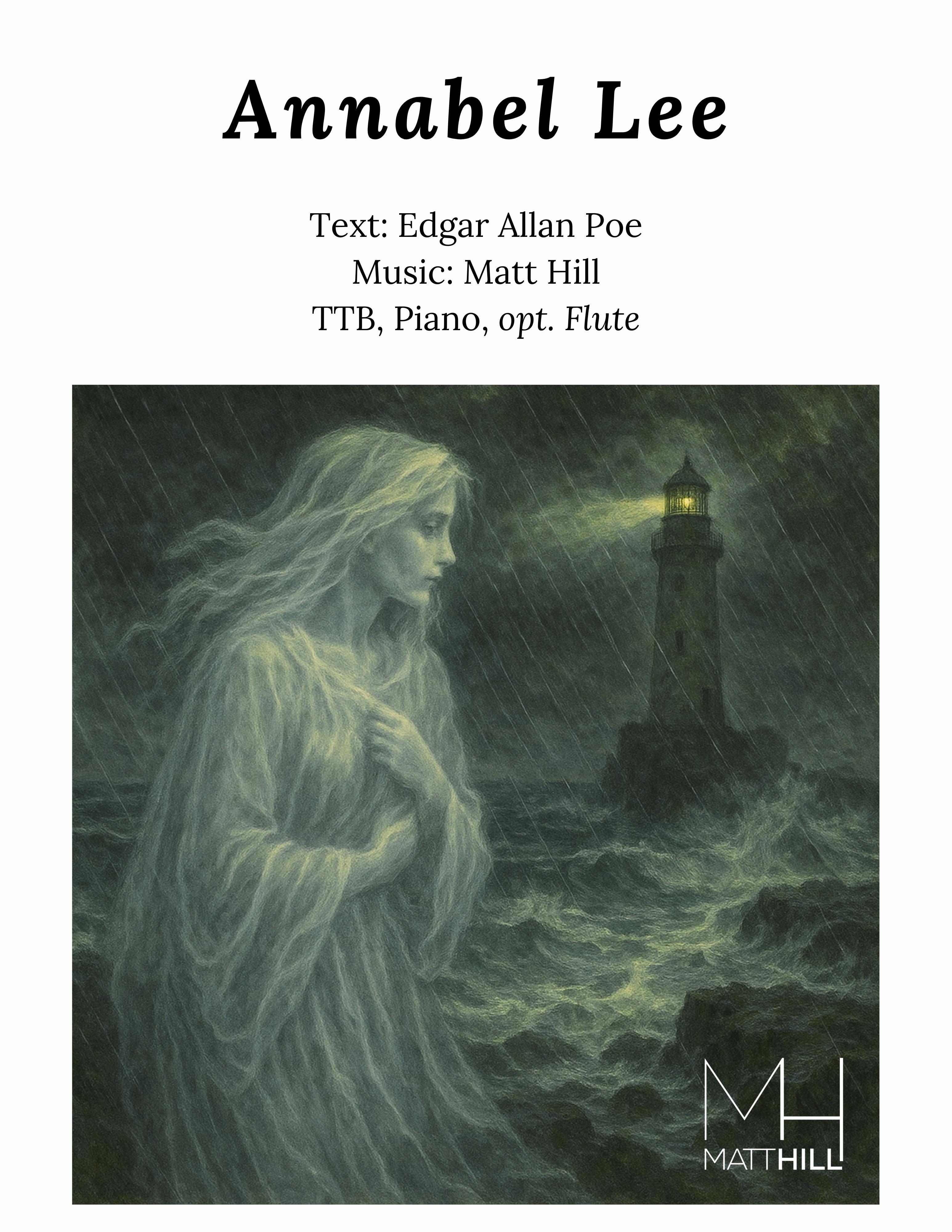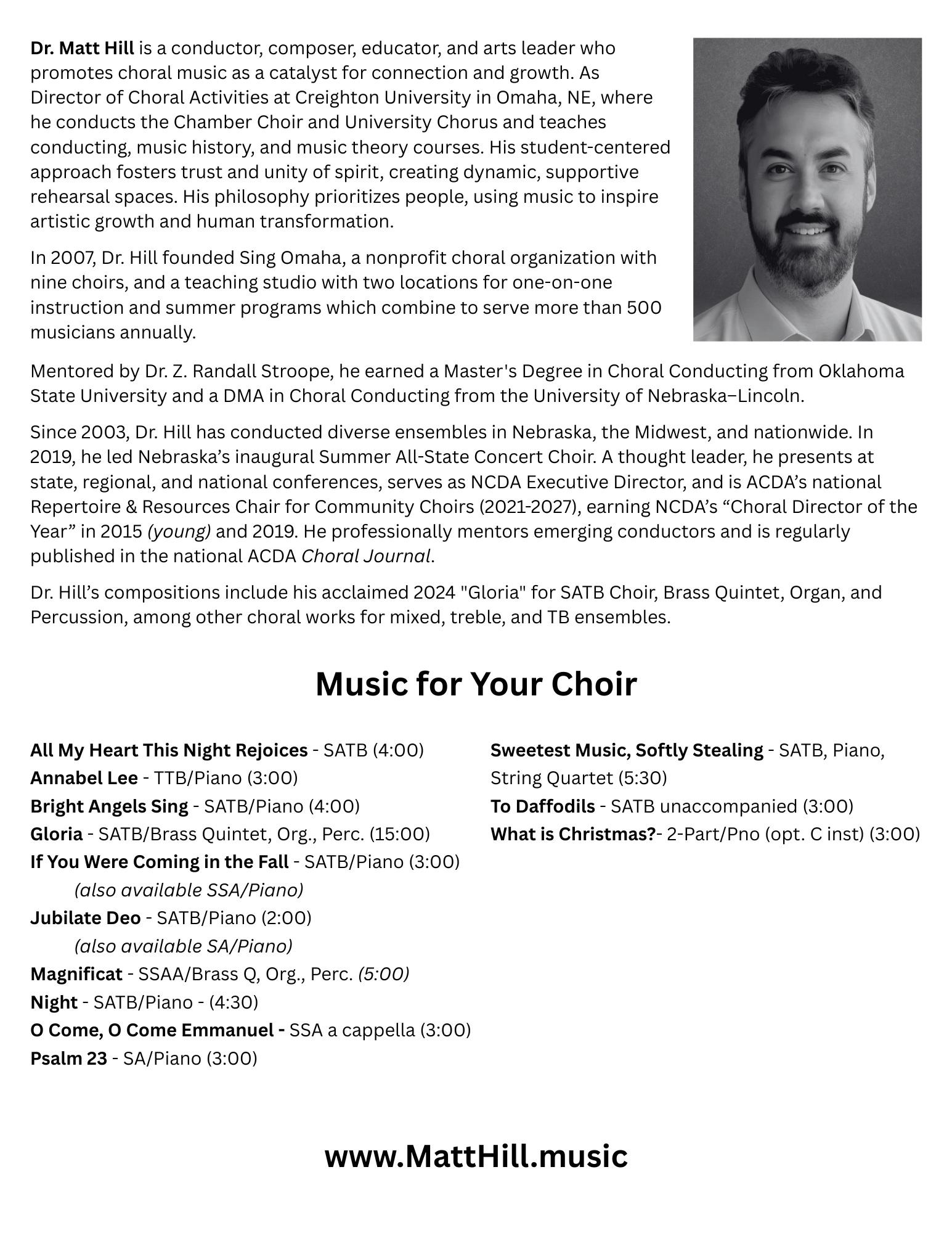
Composer's Note:
The poetry of Edgar Allan Poe is full of deep imagery and emotion. Unlike typical sea chanty subject matter, this text takes the singers and listeners on a journey of love and loss in dramatic fasion! Much of the music composed for TB choirs lives in the world of novelty; music that might be fun to sing, but that may not always have much lyrical substance. In "Annabel Lee", singers will explore a beloved story set to music in a familiar style that allows the voices and pianist to shine!
Synopsis of "Annabel Lee":
Edgar Allan Poe’s “Annabel Lee” is a hauntingly lyrical poem that tells the story of a deep and pure love between the narrator and a maiden named Annabel Lee. Set in a "kingdom by the sea," the poem reflects on their idyllic love, which is so powerful that even the angels envy it. This envy, the narrator claims, leads to Annabel Lee's untimely death. Despite her passing, the narrator insists that their souls remain connected, and he lies beside her tomb each night, a testament to a love that endures beyond death.
Historical Context:
“Annabel Lee” was the last complete poem Edgar Allan Poe wrote before his death in 1849, and it was published posthumously later that year. The poem reflects Poe’s recurring themes of love, loss, and the supernatural. Many scholars believe the poem was inspired by Poe’s late wife, Virginia Clemm, who died of tuberculosis at a young age and to whom Poe was devoted. The musicality, repetition, and ethereal imagery of “Annabel Lee” have made it one of Poe’s most beloved and enduring works, often cited as a quintessential example of 19th-century American Romantic poetry.
Rehearsal Notes:
Like the poem, the piece is in scored in verses, with each voice part getting at least one chance to have the melody. The singers are the narrator, and the piano is the stormy sea. Each verse builds in intensity, arriving at a powerful and emotional ending. The two-against-three rhythmic relationships should be approached deliberately, and are intended to mimic the instability of a stormy sea. Singers and the pianist should make every effort to be distinct in the interpretation of duple eighth notes versus triple.
Text:
It was many and many a year ago in a kingdom by the sea that a maiden there lived whom you may know by the name of Annabel Lee and this maiden she lived with no other thought than to love and be loved by me.
I was a child and she was a child in this kingdom by the sea but we loved with a love that was more than love, I and my Annabel Lee, with a love that the winged seraphs of heaven coveted her and me.
The angels not half so happy in heaven went envying her and me. Yes, that was the reason, as all men know in this kingdom by the sea, that the wind came out of a cloud by night chilling and killing my Annabel Lee!
For the moon never beams without bringing me dreams of my beautiful Annabel Lee! And the stars never rise but I feel the bright eyes of my darling, my love, and my bride, O my beautiful Annabel Lee!

sea that a maid en - therelived whom you mayknow by the
lovedwithalovethatwas more
I andmyAnna - bel- Lee
lovedwithalovethatwasmore
All men know in thiskingdom - by the sea thatthe thatwasthereason - as all menknowinthis king dom- by the sea thatthe
Lee stars mp nev er- rise but I feel thebright eyes of my
Lee and
the stars nev er- rise but I feel thebright eyes of my

